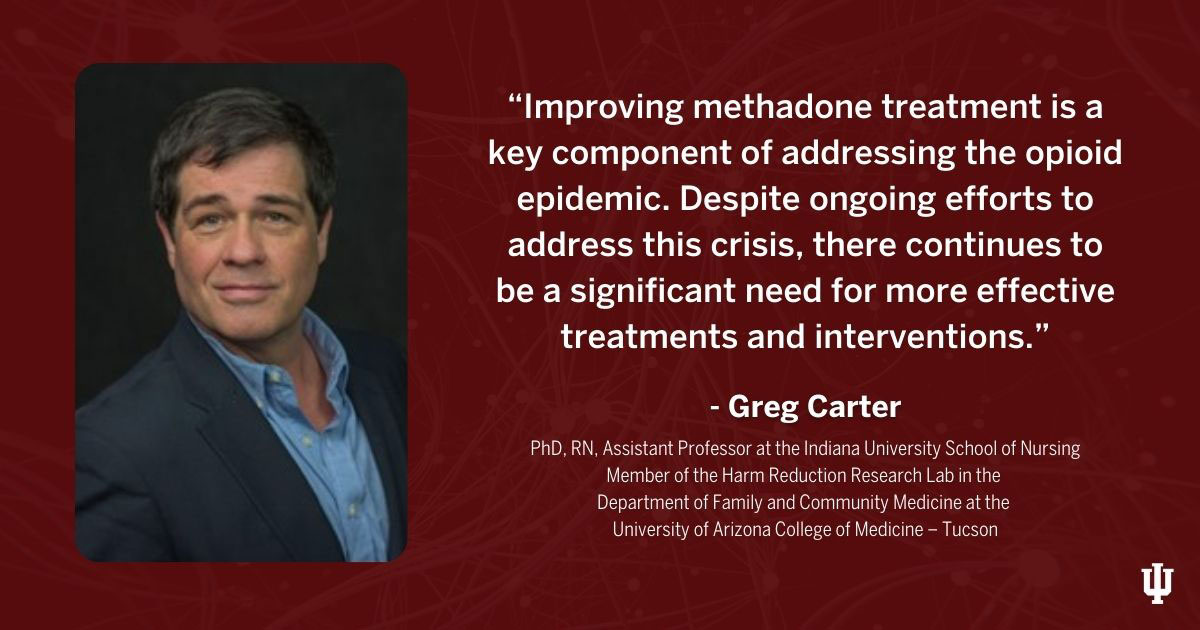Indiana University School of Nursing researchers will use a $1 million grant from the National Institute on Drug Abuse (NIDA) to begin a six-year study that seeks to transform the delivery of methadone, a key treatment for opioid use disorder that is known to reduce overdose deaths.
Greg Carter, PhD, RN, and assistant professor at the Indiana University School of Nursing, is a member of the Harm Reduction Research Lab in the Department of Family and Community Medicine at the University of Arizona College of Medicine – Tucson. The research team recently received funding for “Methadone Patient Access to Collaborative Treatment,” or MPACT. Over the next two years, the study will collaboratively develop and test a patient-empowered, trauma-informed methadone treatment protocol in Arizona.
“Improving methadone treatment is a key component of addressing the opioid epidemic. Despite ongoing efforts to address this crisis, there continues to be a significant need for more effective treatments and interventions. Methadone treatment aligns with the broader societal need for compassionate and effective responses to addiction, underscoring the importance of understanding and improving this method of treatment.,” said Carter. “Methadone is an effective treatment for opioid addiction. But too many people are falling through the cracks. We can and must do better for providers and patients. We need to understand stigma, trauma, misinformation, and fear to create sustainable plans of care. How? With a diverse research team that includes individuals with lived experience. We want to rehumanize addiction research and give those we aim to help a seat at the table. Together, I believe we can make a significant difference.”
MPACT will establish an innovative methadone treatment protocol in collaboration with methadone staff and patients in Arizona. This will be paired with a four-part, staff-focused intervention to reduce work-related trauma to improve care.
The research team includes faculty from across the U.S., including Indiana University, the University of Arizona, New York University, the University of Kentucky, and Western Michigan University. Dr. Carter is working with leaders and staff of Community Medical Services, an organization that operates more than 60 opioid treatment programs, or methadone clinics, in 11 states. Consulting on the study is the Arizona Drug Policy Research and Advocacy Board. The statewide group of providers, patients, people with lived drug use experience, harm reduction organizations, government partners, and payors, which can include entities such as insurance companies or employers that pay for services rendered by health care providers, advises studies across the Harm Reduction Lab.
Funded by NIDA, a division of the National Institutes of Health, this two-year grant is the first of a two-phased multi-year award for the research team.
“This groundbreaking multi-year study represents a first step in assessing the viability, reception, and initial impact of MPACT on both patient and staff outcomes. As we reach our predetermined milestones in the pilot program, the subsequent funding phases will fuel the expansion of the MPACT study across 30 clinics in the U.S., encompassing 600 patients and 450 staff members. Exciting times are ahead!”
The study, “Methadone Patient Access to Collaborative Treatment,” is funded by the National Institute on Drug Abuse, a division of the National Institutes of Health, under award no. R61DA059889.


